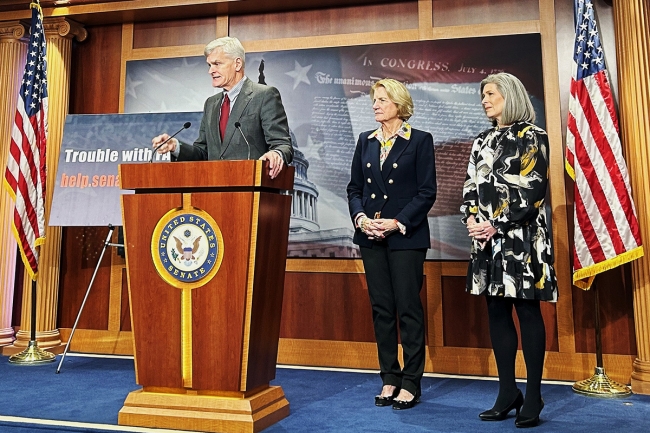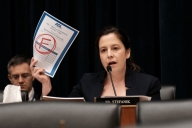You have /5 articles left.
Sign up for a free account or log in.

Leading Senate Republicans (from left, Dr. Bill Cassidy of Louisiana, Shelley Moore Capito of West Virginia and Joni Ernst of Iowa) said the Biden administration neglected to follow the federal law requiring changes to the federal student aid application.
Katherine Knott/Inside Higher Ed
Leading Senate Republicans accused Biden administration officials of focusing on student debt relief at the expense of their core responsibility to update the Free Application for Federal Student Aid, which they said contributed to the troublesome rollout of the new form.
“President Biden and Secretary Cardona, you need to explain why the American people are having to live with the consequences of this administration’s upside-down priorities,” Dr. Bill Cassidy of Louisiana said at a press conference Thursday.
At the request of Cassidy, the senior Republican on the Senate education committee, and other lawmakers, the Government Accountability Office is now looking into the FAFSA launch, which included several technical glitches and other errors. The Education Department said earlier this week that it won’t send completed FAFSAs to colleges until next month, further delaying when institutions can tell students how much aid they can expect.
Congressional Republicans, already critical of the FAFSA rollout, ratcheted up their criticisms, laying the blame squarely at the feet of the Biden administration. The House education committee responded to the news of the delay with a fiery letter to the Education Department and requests for numerous documents that would provide insights into the agency’s planning for the new FAFSA.
Cassidy said that if he were chair of the Senate committee, he would hold a hearing. The Republicans on the committee did launch a website where students, institutions and others can report any issues with the new form.
Senator Shelley Moore Capito of West Virginia, another Republican, said at the press conference that “because of the ineptness of the Department of Education,” students will now have two to three weeks to make decisions about college rather than the months they have had in past years. Students typically have until May 1 to commit to an institution, but a coalition of higher education associations and advocacy organizations has called on colleges and universities to push back that deadline in light of the delay.
“They’ve neglected to follow the law here,” Capito said. “There’s been excuse after excuse. And quite frankly, I think this is one of the biggest obligations of the department.”
The senators said the “botched rollout” could drive away students and harm institutions, particularly smaller colleges that could face a cash crunch if their enrollment numbers drop.
The department said in a statement that its staff has been “working tirelessly” to update the form and overhaul the underlying formula that determines aid eligibility, noting that those “were the most significant changes to the financial aid system in over 40 years.” More than 3.3 million forms have been submitted since the form launched at the beginning of the year.
“And we’ve done all of this with flat funding from Congress and no budget in sight four months into the fiscal year,” the statement said. “We have repeatedly requested additional [Federal Student Aid] funding from Congress to no avail with Congressional Republicans. Meanwhile, despite their criticism and opposition, we are making college more accessible, and we continue the important work of making it simpler and easier for families to get help paying for college.”
When Congress initially passed the FAFSA Simplification Act in December 2020, it required the Education Department to make the mandated changes by the 2023–24 award year. Congress extended the deadline by a year in June 2021.
Cassidy, Capito and other senators who spoke at the news conference dismissed arguments that the department didn’t have enough time or resources to complete the project. They said the department has failed to bring its employees back to the office, citing a 2023 Government Accountability Office report, and spent money instead to carry out debt-relief measures.
“There’s no excuse,” Capito said. “It’s a priority for us. It should be a priority for them. Get people back to work. Fix this now.”







.png?itok=rRo53ZFC)
